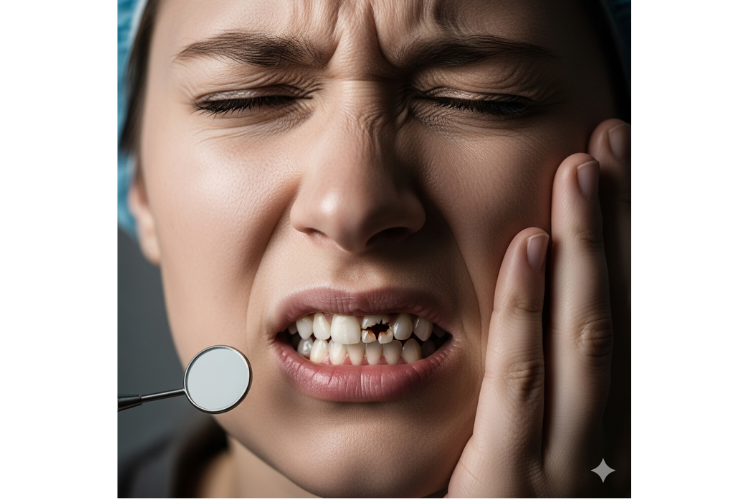
Tabla de contenido
Una emergencia dental es una situación que requiere atención inmediata. No se limita solo a sangrado abundante o Lesiones visibles de alta intensidad. Podrían presentarse algunas enfermedades que, a largo plazo, pueden ser mortales si no se tratan. Sin tratamiento. Ciertas lesiones requieren un tratamiento serio, mientras que otros problemas menores pueden tratarse en casa.
Emergencias dentales vs. emergencias no dentales

Factores como el dolor, la hinchazón y el sangrado identifican la gravedad de una lesión o enfermedad. Si una lesión causa... Dolor insoportable o pérdida significativa de sangre, entonces ese tipo de lesión requiere atención dental de emergencia. Las lesiones que son No es crítico, pero necesita una revisión inmediata debido a la alta intensidad del dolor. Necesita atención dental urgente, por ejemplo, leve. hinchazón o dolor de muelas. Por otro lado, las lesiones que no ponen en peligro la vida y que pueden esperar una revisión estándar... Las citas dentales no son urgencias dentales. Para ver cómo pueden manifestarse estos síntomas (y otros), lea más sobre Dientes problemáticos y sus efectos .
Tipos de emergencias dentales y no dentales
Exploremos los diferentes tipos de lesiones y determinemos cuáles califican como emergencias dentales y cuáles no. consideradas emergencias no dentales.
| Tipo de lesión | Emergencia dental/Emergencia no dental |
|---|---|
| Sangrado incontrolado | Emergencia dental |
| Dolor de muelas severo | Emergencia dental |
| Diente muy agrietado o roto | Emergencia dental |
| Dolor de muelas sordo | Emergencia no dental |
| Corona o empaste perdido | Emergencia no dental |
| Mandíbula dislocada | Emergencia dental |
| Absceso dental | Emergencia dental |
| Comida alojada entre los dientes | Emergencia no dental |
| Infección grave | Emergencia dental |
Si conoce la diferencia entre emergencias dentales y no dentales, actuará rápidamente y buscará la atención adecuada. Ya sea que se trate de un diente caído o una lesión general, comprender dónde pertenece garantiza un tratamiento más rápido y mejores resultados
Dolores dentales que se pueden controlar en casa
Ciertas situaciones requieren atención dental de emergencia, mientras que otras pueden manejarse en casa. Muchos pacientes se preguntan: "¿Puedo...?" ¿Ir al hospital por dolor de muelas? Bueno, eso depende de la intensidad del dolor. Si la gravedad es alta, necesitaría... Trabajo dental de emergencia. Problemas comunes como el dolor causado por los aparatos dentales o la incomodidad causada por los alineadores también pueden ser... Se trata con remedios caseros sencillos. Descubre algunos consejos prácticos para aliviar el dolor con alineadores o, si te parece una molestia, compra alineadores de calidad. de ALIGNERCO para hacerte la vida más fácil.
Si bien una molestia leve a menudo se puede aliviar en casa, un dolor intenso o que empeora es una señal de que puede necesitar atención dental de emergencia. tratamiento.
Encuentre el mejor centro de atención de urgencias dentales

Cuando sufrimos una lesión dental, nuestro primer instinto es tratarla en el centro de urgencias dentales más cercano. Centro. Si no es el más cercano, probablemente el mejor. Veamos qué opciones tenemos en EE. UU.
Nueva York – Atención dental de emergencia de la Universidad de Nueva York
En caso de una emergencia, como dolor, dientes caídos, infección o traumatismo, la Facultad de Odontología de NYU le ofrece El mejor servicio. Con profesionales en el lugar, los tratamientos se gestionan con eficiencia. No se necesita cita previa, ya que Los pacientes son atendidos por orden de llegada.
California – Atención dental de emergencia de la UCSF
Si vive en California y tiene una emergencia dental repentina, puede optar por la Universidad de California, San Clínica de Odontología General para Adultos de Francisco. Tienen la capacidad de tratar una amplia gama de problemas, como Dolores de muelas severos, dientes fracturados, coronas perdidas e incluso infecciones dentales.
Texas - Centro Dental de Emergencia
El Centro Dental de Emergencia está completamente equipado con tecnología moderna. Ofrece atención de emergencia y rutina el mismo día. Chequeos médicos en Houston y alrededores. Pueden atender diversas emergencias porque... Están equipados con la última tecnología.
Florida – Atención dental de emergencia en EE. UU.
Ya sea que un paciente necesite alivio inmediato o tenga una inquietud, 'Emergency Dental Care USA' ofrece atención el mismo día para Pacientes de emergencia y no emergencia por igual. Están abiertos los siete días de la semana y también ofrecen una opción de chat en vivo. Su sitio web. La atención dental de emergencia opera en varios estados además de Florida, incluidos Colorado, Iowa, Minnesota, Nebraska y más.
Illinois – Facultad de Odontología de la UIC
La Facultad de Odontología de la UIC ofrece una amplia gama de servicios dentales en Chicago. Sus servicios incluyen: Odontología, Endodoncia, Medicina Oral y Dolor, Cirugía Oral y Maxilofacial, Ortodoncia, Pediatría Odontología, Periodoncia y Prótesis. Puedes optar por ser tratado por un estudiante de odontología, un especialista residente, o un especialista de la facultad. De cualquier manera, la atención personalizada y el mejor plan de tratamiento para sus necesidades son... Garantizado.
Elija el camino correcto para su atención de emergencia dental

De todos los pasos, el primer paso siempre debe ser "comprender su lesión/enfermedad", ya que hay múltiples Posibilidades. Por ejemplo, tus dientes podrían estar brillantes, pero tu salud bucal podría no ser la mejor. Por lo tanto, es Lo mejor es estar siempre en contacto con un profesional.
Una vez que sepa qué está pasando con su salud bucal, equípese con los productos de cuidado bucal adecuados, como enjuague bucal, irrigador bucal y pasta dental con flúor. Unas prácticas adecuadas de higiene bucal mantendrán tu boca sana y Sin enfermedades. Sin embargo, las lesiones son un tema aparte. Algunas lesiones pueden tratarse en casa, como se mencionó anteriormente. Sin embargo, para los más graves, busque la atención clínica adecuada y obtenga un trabajo dental de emergencia de calidad.
Preguntas frecuentes
1. ¿Qué se considera una emergencia dental?
Un problema bucal grave que requiere tratamiento inmediato se clasifica como una lesión dental. emergencia.
2. ¿Cuál es un ejemplo de una emergencia dental?
Un diente arrancado es un ejemplo de una emergencia dental. Dado que es una emergencia de alta intensidad... lesión, requeriría tratamiento inmediato.
3. ¿Qué hará Urgencias ante una infección dental?
En una sala de emergencias se recetarán antibióticos, se drenará el absceso y se tratará la herida grave. dolor con medicamentos fuertes.
4. ¿Qué no se considera una urgencia dental?
Cualquier lesión menor que no requiera ningún tratamiento serio.
5. ¿Cuáles son los signos de una emergencia dental?
Dolor insoportable, sangrado abundante o pérdida de un diente.
6. ¿Cómo saber si una infección dental se está extendiendo?
Si desarrolla un dolor que le atraviesa la mandíbula, la nariz o el oído, podría significar que la La infección se está propagando.
7. ¿Cuáles son los primeros signos de sepsis por un absceso dental?
Los primeros signos de sepsis incluyen fiebre alta, escalofríos, ritmo cardíaco acelerado, etc.
8. ¿Los antibióticos ayudan con el dolor de muelas?
Los antibióticos en combinación con otros medicamentos pueden aliviar el dolor. Sin embargo, los antibióticos... Solo el tratamiento siempre solucionará la infección.
9. ¿Un dolor de muelas se considera una emergencia dental?
Varios dolores de muelas pueden considerarse una urgencia dental, dependiendo de la intensidad de el dolor.
10. ¿Cuál es la urgencia más común en una clínica dental?
La urgencia más común en una clínica dental es una caries o una infección.
11. ¿Puede un diente roto esperar hasta mañana?
No, podría aumentar las posibilidades de infección o provocar más daños.
12. ¿El dentista extraerá un diente infectado el mismo día?
Sí, un dentista podría extraer un diente infectado el mismo día, pero nunca es el mismo. La opción más segura. Por lo general, intentarán controlar la infección primero para evitar que se propague después. Se extrae el diente.
13. ¿Cuánto cuesta una consulta de dentista de urgencia?
El costo de un dentista de urgencia varía significativamente dependiendo del problema, la ubicación, y dentista.
Citas:
El equipo editorial de Healthline. (8 de marzo de 2019). Todo lo que necesita saber sobre salud bucal y dental. Línea de salud. https://www.healthline.com/health/dental-and-oral-health
Cafasso, J. (13 de marzo de 2023). Primeros auxilios para el alivio del dolor de muelas. Healthline. https://www.healthline.com/health/dental-and-oral-health/emergency-toothache-alief
Urgencias dentales - Asociación Dental de Ontario. (26 de junio de 2025). Asociación Dental de Ontario. https://www.oda.ca/conceptos-basicos-de-salud-oral/emergencias-dentales/





